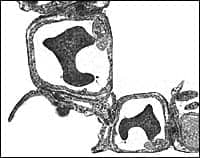New research has identified genes that could help protect lung cells against the harm caused by chronic obstructive pulmonary disease (COPD) and potentially reverse some symptoms.
“I see COPD patients, so this was something very important to me,” says the study’s lead author Corrine Kliment, a lung disease researcher and physician at the University of Pittsburgh. To search for potentially useful genes, Kliment and her team turned to the soil-dwelling amoeba Dictyostelium discoideum.
Amoebas have many genes that are also found in humans, but the microscopic creatures have much shorter life cycles—so scientists can use them to quickly spot genes of interest before studying mammalian models. “We often joke that humans are just amoebas with hair,” says study senior author Douglas Robinson, a researcher at Johns Hopkins University.
About 75 percent of COPD deaths are linked to smoking cigarettes. So Robinson’s laboratory (in four short weeks) screened 35,000 amoebas, whose genes were modified to overproduce a range of different proteins, to see if any of those proteins might protect the amoebas from smoke damage. When researchers exposed all the amoebas to cigarette smoke extract, they found the ones that fared best were overproducing certain proteins important for cellular metabolism.
Next they looked for those same proteins in human and mouse lung cells. They found that cells from smokers, COPD patients and mice with long-term smoke exposure produced less of one of those proteins in particular, called ANT2.










